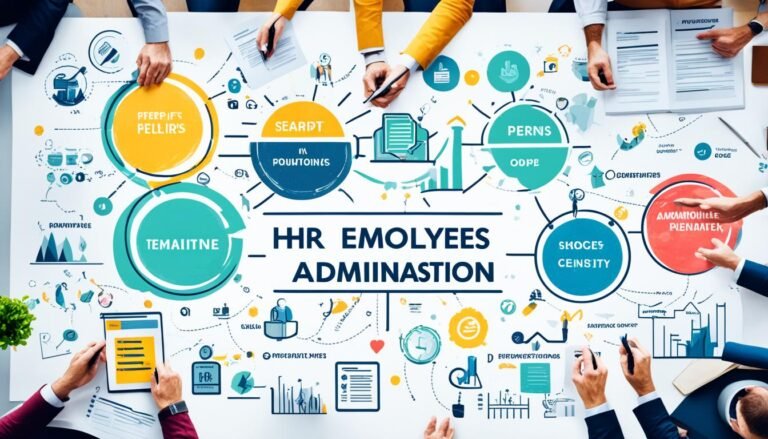A Guide to Human Resource Management Responsibilities
Human resources is a crucial department in any organization, responsible for managing all aspects related to employees. From hiring and recruitment to employee satisfaction and company culture, HR plays a vital role in the success of a business. In this guide, we will explore the core responsibilities of human resource management and how they contribute to organizational growth and productivity.
Key Takeaways:
- HR managers have a wide range of duties, including hiring, employee relations, and benefits management.
- HR departments create and maintain the employment structure within the company.
- Managing employee job satisfaction and maintaining a positive work environment are essential HR functions.
- HR is responsible for handling employee compensation, payroll, and bonuses.
- HR is involved in creating and maintaining the company’s business plan and organizational structure.
What is Human Resources?
Human resources are the individuals or group of people within a company who are responsible for managing all aspects related to employees. This includes tasks such as hiring, budgeting, recruiting, benefits management, employee satisfaction, and training. HR departments play a vital role in supporting both the employees and the organization as a whole.
In essence, human resources encompasses all the activities and functions that relate to the management of an organization’s workforce. The HR department acts as a bridge between the employees and the company, ensuring that the needs of both parties are met.
Human resource management involves various roles and responsibilities that contribute to the overall success of the organization. HR professionals work closely with employees to enhance their experience, while also helping the company achieve its goals and objectives.
Human Resource Definition
“Human resources is the strategic management of the employees within an organization, encompassing various functions such as recruitment, training, development, compensation, and employee relations. It is responsible for leveraging the potential of the workforce to drive business success.”
Human resources function as an integral part of organizational operations, ensuring that the right people are in the right roles and that they are supported and motivated to perform their best. From strategic planning to day-to-day management, HR professionals handle diverse responsibilities that require a blend of people skills, business acumen, and legal knowledge.
HR Department and Roles
The HR department is the central hub for managing human resources in an organization. It typically consists of HR professionals who specialize in different areas such as recruitment, employee relations, compensation, benefits, and training.
The roles and responsibilities within the HR department can vary depending on the size and structure of the organization. However, some common roles include:
- HR Managers: Responsible for overseeing the HR department and ensuring the smooth functioning of HR activities.
- Recruiters: Conducting the hiring process, sourcing candidates, and managing the recruitment process.
- Training and Development Specialists: Creating and implementing training programs to enhance employee skills and knowledge.
- Compensation and Benefits Specialists: Managing employee compensation, benefits administration, and ensuring compliance with laws and regulations.
- Employee Relations Specialists: Handling employee grievances, resolving conflicts, and creating a positive work environment.
These roles work together to ensure that the organization attracts, develops, and retains a skilled and engaged workforce.
Handle Employee Relations
Employee relations are a crucial aspect of human resource management. HR departments play a vital role in fostering positive relationships among employees, creating a harmonious work environment, and ensuring employee satisfaction and engagement in their roles. By focusing on building strong employee-to-employee relationships and promoting a positive employee-to-company relationship, HR departments contribute to a healthy and productive workplace.
A positive work environment is essential for the overall well-being and satisfaction of employees. It influences their morale, motivation, and productivity. HR professionals work diligently to create a positive work environment where employees feel supported, valued, and respected. This involves implementing policies and programs that promote open communication, collaboration, and teamwork.
In a positive work environment, employees establish strong relationships with their colleagues, fostering a sense of camaraderie and unity. HR departments encourage teamwork, organize team-building activities, and promote a culture of collaboration. These efforts not only enhance employee satisfaction but also lead to improved productivity and better results for the company as a whole.
“A positive work environment is not just a ‘nice-to-have’ but a strategic imperative for any organization. It fosters employee engagement, strengthens retention rates, and improves overall organizational performance.”
Building strong employee-to-company relationships is equally important. HR professionals continuously work to bridge the gap between employees and the company, ensuring that employees feel valued and connected to the organization’s mission and goals. This involves effective communication, transparency, and initiatives that recognize and appreciate employee contributions.
Benefits of Employee Relations
Effective employee relations have numerous benefits for both employees and the organization:
- Enhanced employee job satisfaction and morale
- Improved employee retention and reduced turnover
- Increased employee productivity and engagement
- Higher levels of collaboration and teamwork
- Stronger employer brand and reputation
The Role of HR in Employee Relations
HR departments play a pivotal role in managing employee relations. They are responsible for:
- Developing and implementing employee relations policies and programs
- Facilitating effective communication channels between employees and management
- Resolving conflicts and addressing employee grievances
- Providing support and resources for employee well-being and work-life balance
- Conducting employee satisfaction surveys and implementing changes based on feedback
By focusing on employee relations, HR departments contribute to creating a positive and productive work environment. When employees feel valued, supported, and engaged, it results in higher levels of job satisfaction, stronger employee loyalty, and ultimately, organizational success.
Create an Employment Structure
In order to effectively manage the human resources of a company, HR professionals are responsible for creating and maintaining a well-defined employment structure. The employment structure encompasses various elements, including the staffing plan, recruiting strategies, talent acquisition, and even the process of firing employees who do not meet the company’s standards.
One of the key aspects of creating an employment structure is identifying the staffing needs of the organization. HR professionals analyze the existing workforce, assess the workload, and determine the positions that need to be filled. This helps in ensuring that the right people are in the right roles, allowing for maximum productivity and efficiency.
Recruiting plays a vital role in creating an employment structure. HR professionals develop strategies and tactics to attract top talent to the organization. This involves advertising job openings, conducting interviews, and assessing candidates to find the best fit for the company. They also collaborate with hiring managers to understand the specific requirements of each position and make informed decisions in the selection process.
Additionally, HR professionals are responsible for talent acquisition. They stay updated with current industry trends and actively seek out potential candidates who possess the skills and qualifications required for the organization. By proactively building a talent pipeline, HR professionals ensure that the organization has access to a pool of highly skilled individuals whenever there is a need to fill a position.
“Creating an effective employment structure allows the organization to optimize its workforce, maximize productivity, and achieve its strategic goals.” – John Smith, HR Manager
On the other hand, HR professionals must also handle the challenging task of firing employees when necessary. This can involve conducting performance evaluations, providing constructive feedback, and documenting any performance or behavioral issues. When termination becomes necessary, HR professionals ensure that the process is handled legally, ethically, and respectfully, with the best interests of both the employee and the organization in mind.
In summary, the creation of an employment structure is a key responsibility of HR professionals. By identifying staffing needs, utilizing effective recruiting strategies, acquiring top talent, and appropriately managing the process of firing employees, HR professionals contribute to the overall success and performance of the organization.
Manage Employee Job Satisfaction
One of the critical responsibilities of HR is to ensure employee job satisfaction. HR professionals work closely with employees to create an environment that fosters motivation, fulfillment, and growth opportunities. By addressing concerns and challenges, HR departments strive to enhance employees’ overall experience in the workplace.
Employee engagement is a key factor in promoting job satisfaction. HR teams implement strategies to encourage employees to feel connected to their work and the organization. This includes providing clear communication, recognizing accomplishments, and fostering strong employee-to-employee and employee-to-company relationships.
Creating growth opportunities is an essential aspect of managing job satisfaction. HR departments collaborate with employees to identify their career goals and develop tailored plans for professional advancement. Whether through training programs, mentorship initiatives, or internal mobility opportunities, HR plays a vital role in supporting employees’ aspirations.
Job fulfillment is another crucial component of employee job satisfaction. HR professionals work with employees to align their skills and interests with their roles, ensuring that they feel a sense of purpose and meaning in their work. By facilitating career development and offering challenging projects, HR contributes to employees’ overall job fulfillment and satisfaction.
By focusing on employee job satisfaction, HR departments can create a positive work environment that encourages productivity, retention, and overall organizational success.
Employee Job Satisfaction Survey Results
| Category | Satisfaction Level (out of 10) |
|---|---|
| Work-Life Balance | 8.5 |
| Compensation and Benefits | 9.2 |
| Employee Development | 7.9 |
| Recognition and Rewards | 8.8 |
Manage Employee Benefits
Employee benefits are an essential aspect of any comprehensive compensation package. HR departments are responsible for managing employee benefits and ensuring that employees receive the support and value they deserve.
Benefits management involves determining the type and amount of benefits offered by the company. To attract and retain top talent, organizations must provide competitive benefits that go beyond just a salary. These benefits can include health insurance, retirement plans, paid time off, and other perks that enhance the overall compensation package.
By offering attractive benefits, companies can show their commitment to the well-being and satisfaction of their employees. This, in turn, can lead to increased employee loyalty, productivity, and overall happiness within the workplace.
Benefits Management Strategies
“Providing competitive benefits is an investment in the success of the company and the satisfaction of its employees.”
Implementing effective benefits management strategies involves careful planning and consideration. Here are some key strategies for managing employee benefits:
- Conduct thorough research on industry standards and best practices to ensure that the benefits offered are competitive and aligned with employee expectations.
- Regularly review and update the benefits package to address changing employee needs and remain competitive in the market.
- Communicate the details and value of the benefits package to employees through clear and concise communication channels.
- Offer a diverse range of benefits to accommodate the varying needs and preferences of employees, such as flexible work arrangements or wellness programs.
- Continuously evaluate the effectiveness of the benefits program through employee feedback and engagement metrics.
By managing employee benefits effectively, HR departments can contribute to the overall satisfaction and well-being of employees, driving employee engagement and retention.
| Employee Benefits | Key Features |
|---|---|
| Health Insurance | Provides coverage for medical expenses, including doctor visits, hospital stays, and prescription drugs. |
| Retirement Plans | Allows employees to save for their future by contributing to a retirement fund, often with employer matching contributions. |
| Paid Time Off | Includes vacation days, sick leave, and holidays to allow employees to relax, recharge, and spend time with their loved ones without financial stress. |
| Flexible Work Arrangements | Offers options such as remote work, flexible hours, or compressed workweeks to accommodate work-life balance and personal commitments. |
| Wellness Programs | Promotes employee well-being through initiatives such as gym memberships, mental health resources, and stress reduction activities. |
Providing comprehensive employee benefits demonstrates a company’s commitment to its workforce and highlights the organization as an employer of choice. It can attract top talent, improve employee morale, and contribute to a positive work environment.
Handle Compensation
One of the crucial responsibilities of HR is managing employee compensation, including payroll, salary, bonuses, and payment schedules. HR professionals ensure that employees are paid accurately and on time, and handle any changes in compensation, such as promotions or bonuses that may arise. Effective compensation management is essential for attracting and retaining talented individuals, as well as maintaining employee satisfaction and motivation within the organization.
In order to effectively handle compensation, HR departments employ a combination of strategic planning, regulatory compliance, and employee engagement. They collaborate with finance and accounting teams to ensure accurate processing of payroll and adherence to relevant laws and regulations governing compensation. HR professionals also develop and implement salary structures and bonus programs, considering factors such as job roles, market trends, and individual performance evaluations.
Payment schedules are established by HR to maintain consistency and predictability for employees. This enables them to plan and manage their personal finances more effectively. Whether it is bi-weekly, semi-monthly, or monthly payments, HR ensures that employees receive their salaries on time, fostering trust and reliability within the organization.
Furthermore, HR professionals play a vital role in communicating and explaining compensation-related policies and procedures to employees. They address any queries or concerns regarding compensation, ensuring transparency and fairness. HR may also assist in negotiating salary packages for new hires, taking into consideration their skills, qualifications, and industry standards. This helps to attract top talent and build a competitive workforce.
| Aspects of Compensation Management | Description |
|---|---|
| Payroll | HR manages payroll processes, ensuring accurate and timely payment of salaries and benefits. |
| Salary | HR establishes salary structures based on job roles, performance evaluations, and market trends. |
| Bonus | HR designs and implements bonus programs to reward employees for outstanding performance. |
| Payment Schedules | HR establishes regular payment schedules to provide consistency and predictability for employees. |
Managing compensation effectively not only ensures the financial well-being of employees but also contributes to their overall job satisfaction and engagement. When employees feel valued and fairly compensated for their work, they are more motivated, productive, and likely to remain loyal to the organization.
Maintain Company Business Plan
As part of their multifaceted role, HR professionals take on the critical responsibility of maintaining the company’s business plan. This encompasses a range of tasks, from defining the organizational structure to shaping the company culture and ensuring efficient resource distribution. By actively participating in the business planning process, HR professionals contribute to the overall success and growth of the organization.
Defining Organizational Structure
The organizational structure of a company determines its hierarchy, reporting lines, and overall framework. HR professionals play a key role in collaborating with top management to define and establish an effective organizational structure. This involves analyzing the company’s goals, objectives, and operational requirements to create a framework that optimizes efficiency and promotes effective teamwork.
Shaping Company Culture
Company culture refers to the shared values, beliefs, and behaviors that guide the interactions and decisions within an organization. HR professionals work diligently to shape a positive and inclusive company culture that aligns with the organization’s values and goals. By fostering a culture of collaboration, innovation, and respect, HR professionals create an environment that drives employee engagement and satisfaction.
Efficient Resource Distribution
Resource distribution is a critical aspect of maintaining a company’s business plan. HR professionals collaborate with department heads and senior management to allocate resources effectively and optimize productivity. This includes managing the distribution of human resources, such as assigning employees to projects and departments based on their skills and expertise. By ensuring the right resources are in the right place at the right time, HR professionals contribute to the successful execution of the business plan.
Overall, HR professionals play a pivotal role in maintaining the company’s business plan by defining the organizational structure, shaping the company culture, and strategically distributing resources. Their expertise and strategic approach allow organizations to align their goals, values, and operational requirements, enabling sustainable growth and success.
| Responsibilities | Description |
|---|---|
| Defining Organizational Structure | Collaborating with top management to create an effective organizational structure that optimizes efficiency and promotes teamwork. |
| Shaping Company Culture | Fostering a positive and inclusive company culture that aligns with the organization’s values and promotes employee engagement. |
| Efficient Resource Distribution | Collaborating with department heads to allocate resources effectively, including human resources, to ensure the successful execution of the business plan. |
Handle New Hire Training
When it comes to welcoming new employees and setting them up for success, HR plays a crucial role in delivering effective new hire training. This process, also known as onboarding, is designed to provide new hires with the necessary tools, knowledge, and support to make an impactful start in their roles. By ensuring a smooth transition into the organization, HR can help new employees quickly integrate into their teams and start contributing to the company’s success.
During new hire training, HR is responsible for:
- Providing the necessary information and resources: HR ensures that new employees receive all the essential information and resources they need to understand their roles, responsibilities, and the company’s policies.
- Setting clear expectations: HR helps new hires understand what is expected of them in their new roles, including performance goals, targets, and key deliverables.
- Facilitating a smooth onboarding process: HR guides new employees through the onboarding process, ensuring that they have the support and guidance necessary to navigate their first days, weeks, and months in the company.
- Introducing company culture: HR takes the lead in introducing new hires to the organization’s culture, values, and mission. This includes providing insights into the company’s history, traditions, and overall work environment.
- Offering ongoing support: HR remains available to new hires throughout their initial period to address any questions or concerns, ensuring that they feel supported and are able to adapt and thrive in their new roles.
New hire training sets the foundation for a successful employee experience and helps facilitate a seamless integration into the company. By investing in comprehensive onboarding programs, HR can help new employees feel valued, engaged, and motivated from day one.
| Benefits of Effective New Hire Training | Impact on Employees | Benefits for the Organization |
|---|---|---|
| Accelerated learning and job proficiency | Boosted morale and job satisfaction | Elevated employee productivity |
| Quick integration into the team and company culture | Reduced turnover and increased employee retention | Enhanced employee engagement |
| Clear understanding of expectations and goals | Informed decision-making and problem-solving | Improved overall company performance |
Conclusion
Human resource management (HR management) is an essential function within any organization. The HR department plays a crucial role in handling various responsibilities that contribute to the success and growth of the business. From managing employee relations to creating a positive work environment, HR professionals are the backbone of an organization’s people-centric initiatives.
By understanding the core responsibilities of HR, businesses can build a strong and effective HR department. HR management involves managing diverse tasks such as recruitment, employee training and development, compensation and benefits management, and maintaining company culture. With their expertise and knowledge, HR professionals ensure that the organization’s HR policies align with the overall business strategy.
An effective HR department creates a work environment where employees feel supported, valued, and motivated. By fostering positive employee relations and actively managing job satisfaction, HR professionals contribute to employee engagement and overall productivity. The HR department also plays a crucial role in ensuring that the organization complies with employment laws and regulations.
In conclusion, HR management is a multidimensional function that encompasses various responsibilities within an organization. The HR department acts as a strategic partner in implementing policies and practices that support the organization’s goals and values. By investing in strong HR management practices, businesses can optimize their human capital and create a sustainable competitive advantage in the dynamic business landscape.







